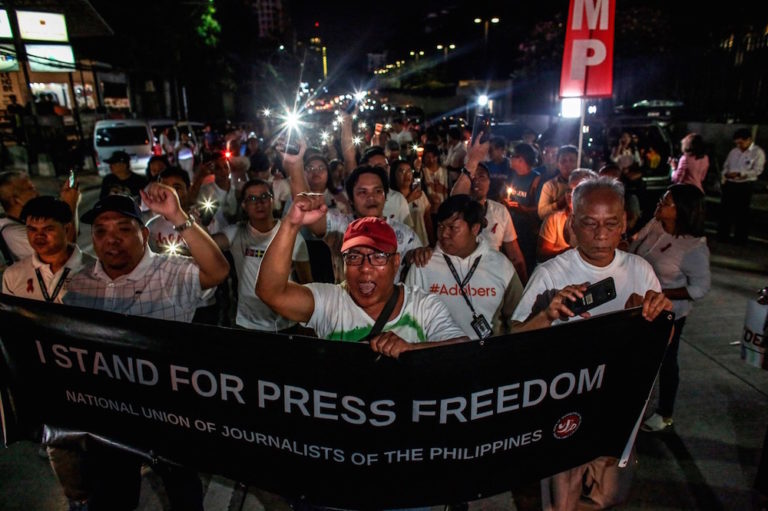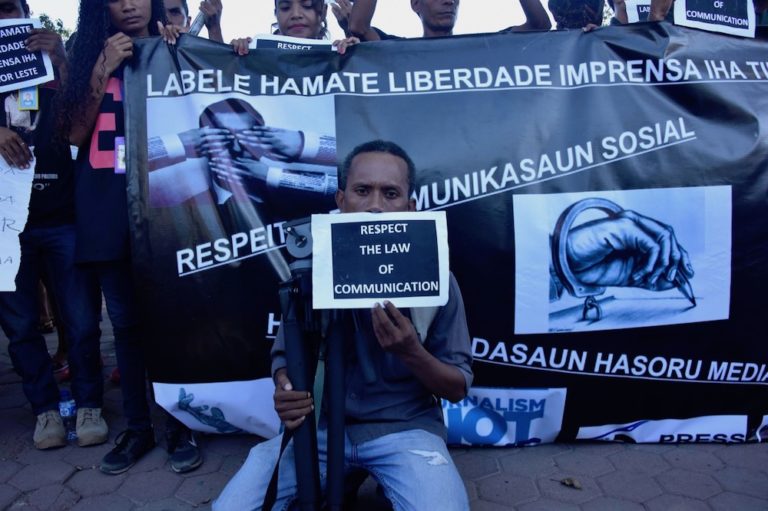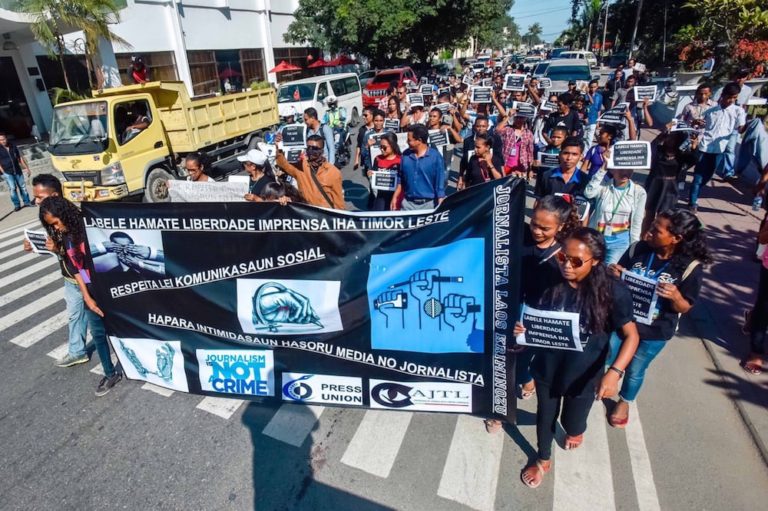(RSF/IFEX) – The following is an RSF press release: **For background on cases mentioned see IFEX alerts of 26 August, 25 August, 3 June, 31 May, 25 May, 10 May and 21 April 1999 and others** 30 August 1999 – Referendum in East Timor RSF says pro-Jakarta militia and the Indonesian army have sabotaged free […]
(RSF/IFEX) – The following is an RSF press release:
**For background on cases mentioned see IFEX alerts of 26 August, 25 August,
3 June, 31 May, 25 May, 10 May and 21 April 1999 and others**
30 August 1999 – Referendum in East Timor
RSF says pro-Jakarta militia and the Indonesian army have sabotaged free
access to information
The people of East Timor go to the polls on 30 August to vote on the
autonomy or independence of the territory invaded by Indonesia in 1975. The
organisation of the voting and the electoral campaign have been marred by
violence from pro-Indonesian paramilitary groups supported by Jakarta,
particularly against independent East Timor and Indonesian journalists and
foreign correspondents. The Indonesian police and army have also been guilty
of harassment of Indonesian reporters and have on several occasions failed
in their duty to protect the media. Indonesian broadcasters, most of which
are controlled by people close to the government, often “forget” to present
the views of those campaigning for independence.
Reporters Sans Frontières considers that the atmosphere prevailing since the
election date was announced and throughout the campaign is bound to affect
the result. As we believe that there can be no free and fair elections
without a free press, our organisation condemns the violence, intimidation
and harassment carried on against journalists by the “pro-integration”
militia, and to a lesser extent by the Indonesian army, with the obvious
intention of preventing people in Indonesia and East Timor from having full
access to information about the poll. Reporters Sans Frontières believes
that the Indonesian government is largely to blame for this situation
because it has failed to take the appropriate steps to disarm the militia
and provide adequate protection for reporters in the territory, enabling
them to work freely and safely.
The authorities recently gave clear proof of their negative attitude: on 23
August, Amy Goodman, a journalist with the American station Pacifica Radio
and presenter of the programme “Democracy Now!”, said she had been prevented
from boarding a plane for Dili, the capital of East Timor, at Bali airport.
She was told she could not go to East Timor because her name was on a
blacklist. Amy Goodman was one of the two American reporters in Dili in 1991
when the Indonesian army fired into a crowd, killing over 200 people (the
government says 50 were killed).
According to various sources, the Indonesian army, police and secret service
have been threatening journalists for several months and have refused to
give them any protection. In early August, a reporter with a newspaper based
in Jakarta was summoned by members of the Intelligence Agency and told not
to use a story the paper was about to print. On 15 August, a photographer
with the daily Kompas received two calls, one from an army officer and one
from a militiaman, warning him against having his work published and
accusing him of being “pro-independence” – which amounts to an open threat
in East Timor.
Those two recent examples are typical of the attitude of the Indonesian
armed forces and militia. But the most serious incidents occurred in April
during an offensive by pro-Jakarta militia. On 17 April, the Besi Merah
Putih (Red and White Iron) militia sent several of its members to wreck the
offices of the independent newspaper Suara Timor Timur in Dili. All its
equipment was destroyed and two journalists subsequently decided to go into
hiding in Jakarta. The newspaper had to suspend publication for two weeks.
Since it has been back on sale, Suara Timor Timur has changed its editorial
line for fear of reprisals from the militia.
Other instances illustrate the pro-Indonesian militias’ determination to
prevent foreign journalists from doing their work freely. On 25 August, John
Stanmeyer, a photographer with Time Magazine, and his East Timor assistant
were violently beaten by a group of about 20 people as they were taking
pictures outside the Dili headquarters of the pro-Indonesian militia
Aitarak. They had been covering a pro-independence demonstration that had
gone off without trouble. In the spring several other journalists were
prevented from doing their work. On 17 April, Bernard Estrade, bureau chief
of the French news agency Agence France-Presse (AFP) in Jakarta, and
Marie-Pierre Vérot, a French freelancer, were assaulted and threatened with
execution after being thrown out of the home of independence movement leader
Manuel Jose Carrascalao. The house had been attacked by over 100 supporters
of the “pro-integration” movement. A Dutch journalist from Volkskrant and a
Briton from The Banker were also targets of death threats near the house.
Foreign reporters – particularly Australian and Portuguese – have been
victims of many assaults, especially when covering demonstrations and
political rallies by campaigners for independence, or going to the scene of
clashes or massacres. On 18 May, John Martinkus, of the news agency
Australian Associated Press (AAP), was arrested by militia wearing the
colours of Indonesia as they were trying to go to an area where massacres
had been reported. On 10 May, the Sydney Morning Herald said: “A journalist
from the Australian Broadcasting Corporation (ABC) was driven off after
being threatened with a weapon, a journalist from AAP was struck on the back
with a rock, and militia shouting threats took aim at a Canadian special
correspondent, Ian Timberlake, and seven other journalists…” All of them
were trying to go to a Dili market where a student had been murdered. On 4
May, also in Dili, Mark Dodd, a reporter with the Australian daily The
Herald, was arrested along with several other journalists by members of the
pro-Indonesian militia Aitarak, who also assaulted and threatened to kill
his driver. The militia ordered Jason South of the Australian weekly The Age
and a cameraman from Reuters TV to leave the scene, firing shots in the air.
Unfortunately, this list of violations of press freedom is by no means
exhaustive.
These attacks on foreign reporters, and particularly Australians, have been
more or less endorsed by people close to the Indonesian government. On 30
May Eurico Guterres, leader of Aitarak and a candidat for Golkar (Indonesian
President Habibie’s party) in the June 1999 legislative elections, said:
“Australian journalists are extremists”, and added that he would “kill
anyone who goes to East Timor and does not report exactly what I say.”
Reporters Sans Frontières has no knowledge of journalists and media in East
Timor being intimidated by groups that support independence.


